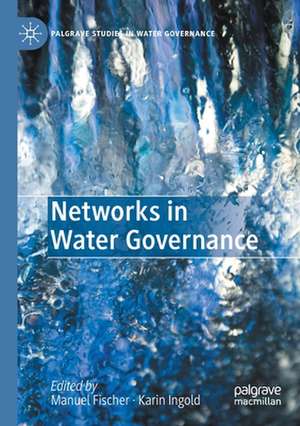Networks in Water Governance: Palgrave Studies in Water Governance: Policy and Practice
Editat de Manuel Fischer, Karin Ingolden Limba Engleză Paperback – 20 aug 2021
With the consequences of climate change and biodiversity loss becoming more and more apparent, both the protection of water resources and water-related ecosystems as well as protection from water, that is flood protection policies, have become increasingly important.
This book explores the latest applications of network analysis concepts and measures to the study and practice of water governance. Given the holistic complexity of water governance, it covers individual water governance aspects such as flood protection and fisheries, as well as overarching concepts like integrated water management and social-ecological interactions. The book provides an overview of current water governance issues, network analytic concepts as well as implications for practice. The main body of the text is made up of eight case studies by world-leading environmental governance scholars, each of which addresses one water-related challenge by applying a variety of networkapproaches. The first part of the book highlights network dispersion and fragmentation, the second focuses on how such fragmentation in networks can be overcome and the third deals with specific roles of actors in networks.
This collection is a key resource for scholars and practitioners interested in water governance all over the world. It provides readers with an overview of the potential of network analytic concepts for research on complex governance problems.
| Toate formatele și edițiile | Preț | Express |
|---|---|---|
| Paperback (1) | 890.37 lei 6-8 săpt. | |
| Springer International Publishing – 20 aug 2021 | 890.37 lei 6-8 săpt. | |
| Hardback (1) | 895.58 lei 6-8 săpt. | |
| Springer International Publishing – 20 aug 2020 | 895.58 lei 6-8 săpt. |
Preț: 890.37 lei
Preț vechi: 1085.82 lei
-18% Nou
Puncte Express: 1336
Preț estimativ în valută:
170.38€ • 182.19$ • 142.05£
170.38€ • 182.19$ • 142.05£
Carte tipărită la comandă
Livrare economică 17 aprilie-01 mai
Preluare comenzi: 021 569.72.76
Specificații
ISBN-13: 9783030467715
ISBN-10: 3030467716
Pagini: 333
Ilustrații: XX, 333 p. 29 illus., 22 illus. in color.
Dimensiuni: 148 x 210 mm
Greutate: 0.43 kg
Ediția:1st ed. 2020
Editura: Springer International Publishing
Colecția Palgrave Macmillan
Seria Palgrave Studies in Water Governance: Policy and Practice
Locul publicării:Cham, Switzerland
ISBN-10: 3030467716
Pagini: 333
Ilustrații: XX, 333 p. 29 illus., 22 illus. in color.
Dimensiuni: 148 x 210 mm
Greutate: 0.43 kg
Ediția:1st ed. 2020
Editura: Springer International Publishing
Colecția Palgrave Macmillan
Seria Palgrave Studies in Water Governance: Policy and Practice
Locul publicării:Cham, Switzerland
Cuprins
Chapter 1 Introduction; Manuel Fischer and Karin Ingold.- Chapter 2 Conceptual Reflections about Water, Governance and Networks; Manuel Fischer and Karin Ingold.- Chapter 3 Network Segregation and Water Governance: The Case of the Spiny Lobster Initiative; Matthew Robbins and Mark Lubell.- Chapter 4Network Embeddedness and the Rate of Water Cooperation and Conflict; James Hollway.- Chapter 5 Identifying Subsystems and Crucial Actors in Water Governance: Analysis of Bipartite Actor – Issue Networks; Mario Angst and Manuel Fischer.- Chapter 6 What drives the Formation and Maintenance of Interest Coalitions in Water Governance Forums?; María Mancilla García and Örjan Bodin.- Chapter 7 Modelling Environmental Governance in the Lake Tahoe Basin: A Multiplex Network Approach; Elizabeth A. Koebele, Stephanie Bultema and Christopher M. Weible.- Chapter 8 Collaboration in Water Quality Management: Differences in Micro-Pollutant Management along the River Rhine.- Laura M. Herzog and Karin Ingold.- Chapter 9 Analyzing Stakeholders’ Network to Water Resources Co-management at a Watershed Scale: a Case Study from the Taleghan Watershed in Iran; Fariba Ebrahimiazarkharan, Mehdi Gorbani, Arash Malekian, Hans Bressers.- Chapter 10 Institutional Design and Complexity: Protocol Network Structure in response to different Collective-Action Dilemmas; Tomás Olivier, Tyler A. Scott and Edella Schlager.- Chapter 11 Comparing Centrality in Policy Networks and Media Narratives; Emily Bell and Adam D. Henry.- Chapter 12 Conclusions; Karin Ingold and Manuel Fischer.
Notă biografică
Manuel Fischer is a research group leader at the Department of Environmental Social Sciences at the Swiss Federal Institute for Water Science and Technology (Eawag) and a lecturer at the Institute of Political Science at the University of Bern, Switzerland. His research deals with water and environmental governance and policy-making.
Karin Ingold is a professor at the Institute of Political Science and the Oeschger Center for Climate Change Research at the University of Bern, Switzerland. She is also affiliated to the Environmental Social Science Department at the Swiss Federal Institute for Water Science and Technology (Eawag). She is interested in policy design and politics of climate change, water and energy.
Textul de pe ultima copertă
With the consequences of climate change and biodiversity loss becoming more and more apparent, both the protection of water resources and water-related ecosystems as well as protection from water, that is flood protection policies, have become increasingly important.
This book explores the latest applications of network analysis concepts and measures to the study and practice of water governance. Given the holistic complexity of water governance, it covers individual water governance aspects such as flood protection and fisheries, as well as overarching concepts like integrated water management and social-ecological interactions. The book provides an overview of current water governance issues, network analytic concepts as well as implications for practice. The main body of the text is made up of eight case studies by world-leading environmental governance scholars, each of which addresses one water-related challenge by applying a variety of networkapproaches. The first part of the book highlights network dispersion and fragmentation, the second focuses on how such fragmentation in networks can be overcome and the third deals with specific roles of actors in networks.
This collection is a key resource for scholars and practitioners interested in water governance all over the world. It provides readers with an overview of the potential of network analytic concepts for research on complex governance problems.
Caracteristici
Discusses the application of network analysis to water governance Introduces 8 water related case studies by leading experts in the field Provides an overview of key water governance concepts and issues



























